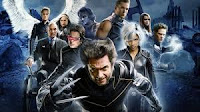When
you think of classic action movie superheroes, which characters stand out to
you the most? Superman? Batman? Spiderman? Well thankfully they all have one
painfully obvious common quality. They are all white.


Now would you be able to think of an equally prominent hero as Superman that has been portrayed by a person of colour in film? I think you’ll find it’s not quite as easy to think of one...
Suzanne made a very interesting point early
within our first lecture, when establishing ideas of race as a constructed
boundary, discussing how “our sense of identity and who we are is based heavily
on who we are not”. We are saturated with recurring positive images of white
male protagonists as indicators of good character, upholding values of justice,
freedom and social responsibility within these hero roles. This constant representation
is showing at a very basic level that society idolizes the white male as a
relatable figure to audiences and that diversity is almost non-existent.
Far too often we see these Hollywood
‘blockbuster’ style films promote the cliché white savior trope with repetitive
type casting, implicitly reinforcing to audiences that heroism is synonymous
with being white.
Let’s take Superman for example, as arguably
the most recognizable character of this genre. Hailing from the dying alien
planet Krypton Superman (Kal-El) travels to Earth and raised to eventually
become an American hero. I find it incredibly concerning that despite
unrestricted creative freedom in the construction of otherworldly being;
Superman is depicted as a handsome white male. It appears that white is the
only appropriate representation in order for Kal to ‘fit in’ with the
normality of our human race. Regardless of the incredibly limited knowledge we
have on alien life forms within our universe, this white male figure stands to
be the dominant portrayal of the people that make up our society.
People of colour are not completely absent
from superhero action films, however they exist almost exclusively as
background supporting roles within major action films.
Perhaps
a valid counter argument to the points I have made would be to focus on Hancock
as a black protagonist within this superhero genre. While it is true that he is
the ‘hero’ of the film, he is a problematic character with questionable
actions, ultimately positioning him as the ‘anti-hero’ figure. Throughout the
film Hancock is highlighted in a heavily negative frame, expressing his
aversion to almost everyone he encounters and reliance on alcohol and vulgar
language in order to survive each day on earth. In this regard Hancock is far
from the traditional heroic characterisation I have previously mentioned.
It then opens up points for discussion on
how such heroic figures may be represented in future. How long do you think it
will take before we are seeing prominent non-white characters on the big
screen?






I totally agree with the ideas presented in this blog. The amount of white heroic figures that are painted all over the Hollywood film industry is just sad. It does make you wonder why cant they have an actor of color portray more films like these? You could even say this is a form of eurocentricism being portrayed through superhero narratives, as these films are most likely made and produced by white males from Hollywood. In terms of what does the future hold for the possibility of non white protagonists for hero films, I would hope sooner rather than later considering I cant think of any off the top of my head so I would also be interested as to when this could happen.
ReplyDelete